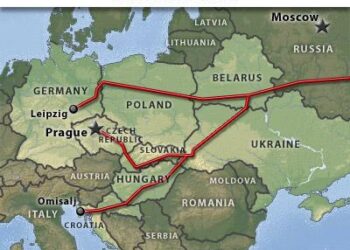As tensions continue to simmer in the Western Balkans, the specter of renewed conflict looms large, exacerbated by a rise in new military alliances that threaten the already fragile peace in this region. Considering evolving geopolitical dynamics and ancient animosities, nations are increasingly pursuing strategic partnerships aimed at bolstering security. Though, these alliances may unintentionally reignite old grievances and escalate military posturing. This article explores the implications of these emerging coalitions, delves into the historical context of regional disputes, and assesses their potential effects on peace and stability within the Western Balkans. With power dynamics precariously balanced, the future of this strategically vital area is more crucial than ever.
Impact of New Military Alliances on Regional Stability
The Western Balkans have long been a focal point for geopolitical conflict; thus, the emergence of new military alliances complicates an already delicate situation. As countries within this region forge new partnerships, there exists a significant risk that power dynamics could shift dramatically. Influential organizations such as NATO and the European Union continue to play pivotal roles in shaping regional interactions; however, alternative coalitions may yield unforeseen consequences. Issues related to military presence, territorial claims, and national sovereignty have emerged as contentious points that raise concerns about long-term prospects for peace.
Recent developments highlight how military alliances can reshape not only diplomatic relations but also public perceptions across the region:
- Increased Militarization: Nations enhancing their defense capabilities might inadvertently heighten existing tensions.
- Security Dilemmas: Greater collaboration among armed forces could trigger an arms race among neighboring countries.
- Divergent Public Opinions: Citizens may find themselves divided between prioritizing national security or promoting regional cooperation.
To further illustrate these shifting geopolitics consider recent changes regarding military affiliations:
| Alliance | Member States |
|————————–|—————————————|
| NATO | Albania, Montenegro, North Macedonia |
| Partnership for Peace | Serbia, Bosnia and Herzegovina |
As these alliances evolve over time maintaining diplomatic efforts will be essential to ensuring peace rather than succumbing to militaristic tendencies.
An Analysis of Geopolitical Shifts Affecting Regional Peace
The evolving landscape concerning military partnerships within the Western Balkans raises alarms about potential instability across this area. Recent trends indicate several nations are inclined toward forming or strengthening such ties—often justified as responses to external pressures or perceived threats. Key factors driving this transformation include:
- Growing Foreign Military Presence: The establishment of bases alongside joint exercises can exacerbate tensions while fostering insecurity among neighboring states.
- Nostalgia for Nationalism: A resurgence in nationalist rhetoric often garners public support for military collaborations while diverting attention from pressing domestic issues.
- The Influence of Global Powers: Major international players are increasingly vying for influence within this region—complicating local dynamics further while entrenching divisions.
The implications for regional tranquility are profound; as nations deepen their military connections with one another—potential flashpoints could emerge that might ignite conflicts or exacerbate existing frictions. This unsettling trend risks leading towards cycles of rearmament which undermine diplomatic initiatives by prioritizing defense strategies over peaceful negotiations:
- Eruptions of Historical Grievances: Long-standing disputes may resurface again threatening cooperative efforts.
- Burgeoning Military Budgets: Resources allocated towards defense could detract from essential social progress.
- Dissolution Among Alliances:A fragmented approach might hinder collaborative solutions addressing shared issues like migration or environmental concerns.
| Country | Military Alliance | Potential Implications |
|——————|———————|————————————–|
| Serbia | Russia | Heightened tensions with NATO |
| Kosovo | USA/NATO | Increased friction with Serbia |
| North Macedonia | NATO | Concerns regarding overall security |
Pursuing Diplomacy and Conflict Resolution Strategies in the Balkans
To effectively tackle emerging threats posed by new military coalitions within Balkan territories requires implementing comprehensive strategies focused on dialog and collaboration among stakeholders involved.Diplomatic initiatives should prioritize establishing robust interaction frameworks across various parties involved—encouraging intergovernmental discussions transcending nationalistic sentiments while tackling common security challenges through key approaches such as:
- Cultivating regional cooperation via multilateral organizations like Southeast European Network for Professionalization (SEENPSS).
- Spearheading joint training exercises aimed at building trust between neighboring states’ armed forces.
- Pursuing confidence-building measures designed specifically to alleviate insecurities felt amongst populations involved.
Moreover incorporating grassroots movements engaging civil society plays an essential role reinforcing diplomacy efforts:
- < li >Establish cultural exchange programs celebrating diverse heritages promoting unity amongst communities
< li >Launch collaborative forums allowing citizens express concerns contributing decision-making processes
< li >Utilize social media campaigns raising awareness around conflict resolution methods encouraging peaceful discourse
Your Takeaway
In conclusion,the shifting landscape surrounding newly formed militarized agreements poses significant risks concerning stability throughout regions still healing from past conflicts.As nations navigate strategic interests amidst ongoing geopolitical strains,it becomes imperative leaders prioritize constructive dialogue over rivalry.The looming possibility unrest necessitates vigilant diplomacy alongside concerted actions fostering secure prosperous futures across all areas affected.As we stand at pivotal crossroads,the global community must remain observant supporting initiatives promoting lasting peace stability throughout volatile regions such as those found within western balkans .















